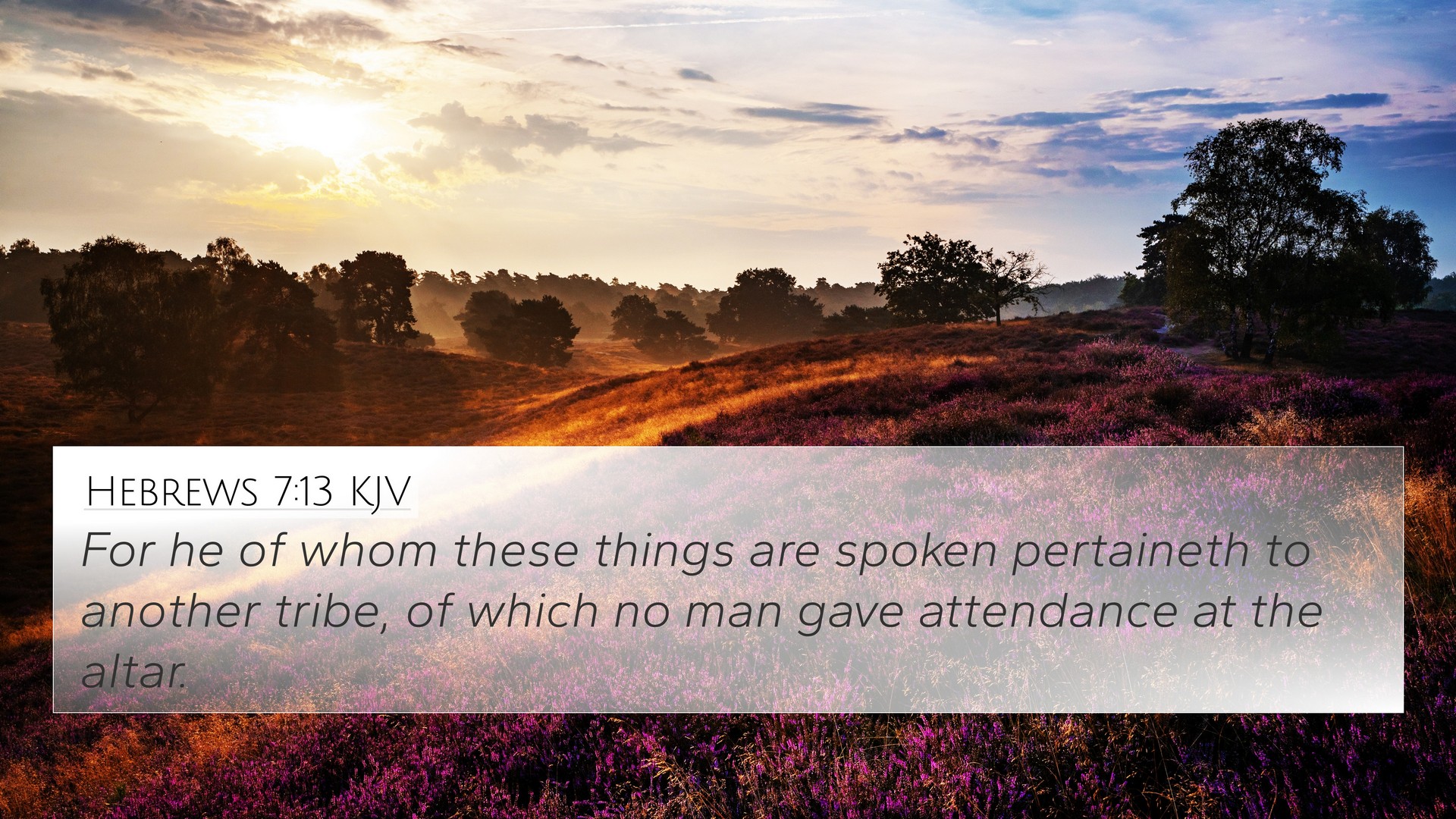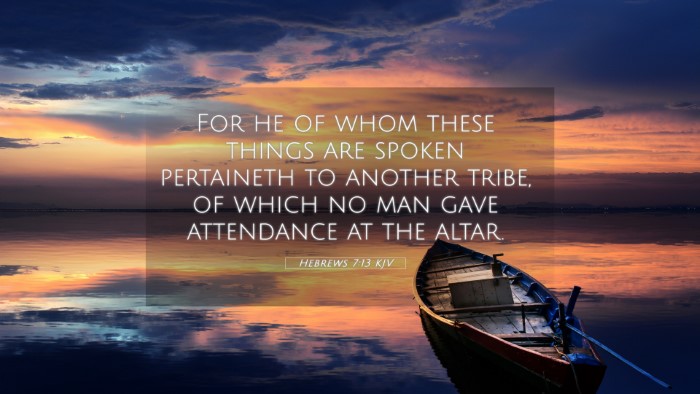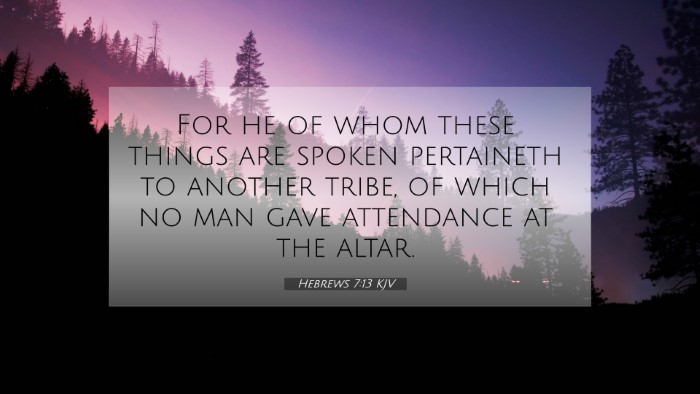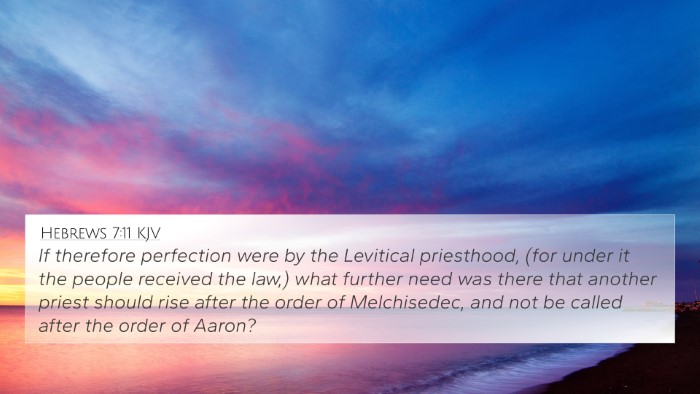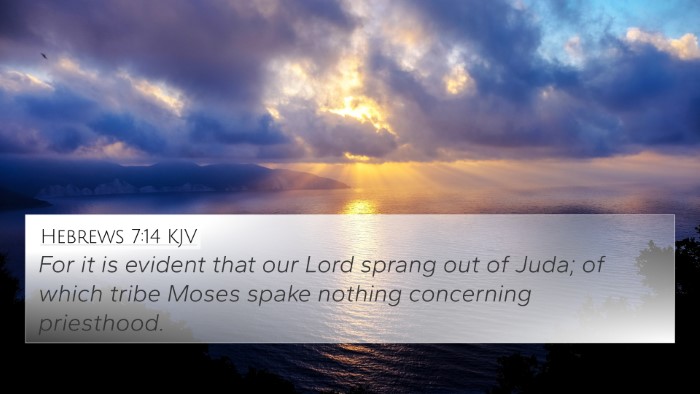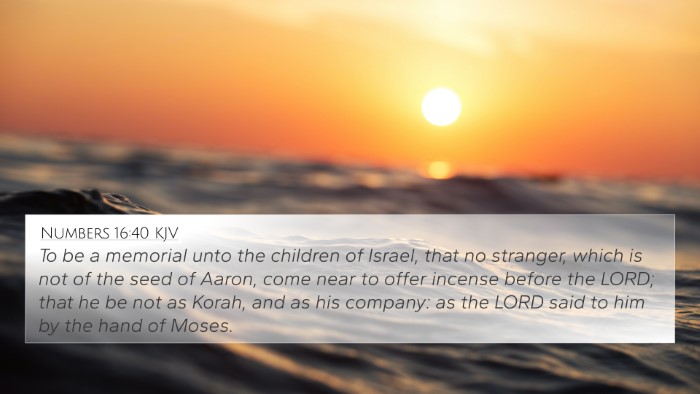Understanding Hebrews 7:13
The verse Hebrews 7:13 states: "For he of whom these things are spoken belongs to another tribe, of which no man gave attendance at the altar." This verse serves as a pivotal reference within the Book of Hebrews, highlighting crucial aspects about the priesthood and its transformation from the Levitical order to that of Melchizedek.
Contextual Background
The author of Hebrews, emphasizing the superiority of Christ's priesthood, points out the significant change in priestly lineage. Melchizedek, a figure from Genesis 14, is portrayed as a prototype of the higher order of priesthood that Jesus embodies. This shift serves to underscore the foundational truths of the Christian faith concerning Christ’s role as both King and Priest.
Commentary Insights
The insights from various public domain commentaries enrich our understanding of this verse. Here are synthesized thoughts from notable scholars:
-
Matthew Henry: Henry points out that because Christ does not belong to the Levitical priesthood, it symbolizes a complete departure from the old covenant. This supports the idea that the former institutions were fulfilled and superseded by the new covenant in Christ.
-
Albert Barnes: Barnes elaborates on the notion that the priesthood of Jesus is not based on the earthly lineage but rather on His eternal and divine nature, which provides believers with assurance and access to God.
-
Adam Clarke: Clarke notes that the reference to "another tribe" emphasizes the uniqueness of Christ's priesthood, not stemming from the established order but through divine appointment, which reinforces His authority and legitimacy.
Key Themes and Interpretations
Hebrews 7:13 brings forward several key themes:
- Transformative Priesthood: The transition from the Levitical priesthood to Christ signifies a transformative moment in spiritual history, indicating the new order established by Jesus.
- Symbolism of Melchizedek: The use of Melchizedek as a figure serves to illustrate the eternal nature of Christ's priesthood, as He is without beginning or end.
- Divine Authority: The emphasis on Christ's separate lineage affirms the divine authority of His ministry, distinct from human tradition.
- Access to God: Followers of Christ are granted direct access to God, signifying a profound change in how humanity interacts with the divine.
Cross-References and Thematic Connections
Understanding Hebrews 7:13 is greatly enhanced by cross-referencing related verses. Here are 10 cross-references that illuminate the themes presented in this verse:
- Genesis 14:18-20: The original mention of Melchizedek as king and priest.
- Psalm 110:4: "You are a priest forever in the order of Melchizedek," confirming the eternal priesthood of Christ.
- Hebrews 5:6: References to Christ being a priest according to the order of Melchizedek.
- Hebrews 6:20: Signifying that Jesus has become a High Priest forever.
- Romans 8:34: Affirming that Christ intercedes for us, underscoring His priestly role.
- 1 Peter 2:9: Illustrating the believer's royal priesthood through Christ.
- Colossians 1:13-14: Emphasizing our redemption and the establishment of a new covenant.
- John 14:6: "I am the way, the truth, and the life," reaffirming Christ as the sole mediator.
- Hebrews 8:1-2: Introducing Jesus as the High Priest seated at the right hand of the throne of majesty.
- Matthew 5:17: Jesus' fulfillment of the Law and the Prophets illustrates His covenantal role.
Conclusion
In conclusion, Hebrews 7:13 encapsulates the transition from the old covenant to the new, driven by the fulfillment found in Christ's eternal priesthood. The insights gathered from various commentaries, coupled with cross-references, provide a comprehensive understanding of the text, emphasizing the depth and richness of the Scriptures. For those exploring Bible verse meanings or seeking to engage in Bible verse analysis, understanding Hebrews 7:13 is essential in grasping the fullness of the Christian faith and its continuity throughout the Biblical narrative.
Further Study Tools
For further exploration of Bible verse cross-references, consider these tools:
- Bible Concordance: An invaluable resource for locating verses based on keywords.
- Bible Cross-Reference Guide: A collection of references that connect themes and messages throughout the text.
- Cross-Reference Bible Study: Engaging in study methods that emphasize the interconnectivity of Scriptures.
- Bible Reference Resources: Comprehensive materials that provide insights into the relationships between various verses.
